Key takeaways:
- Anti-war activism emphasizes empathy, dialogue, and understanding, aiming to resolve conflicts without violence.
- Historical anti-war movements intersect with social justice issues, highlighting the human costs of war and the importance of grassroots initiatives.
- Effective activism requires strategic collaboration, storytelling, and leveraging social media to amplify messages and connect with broader audiences.
- Self-care and embracing vulnerability are essential for sustaining activism and fostering deeper connections within communities.
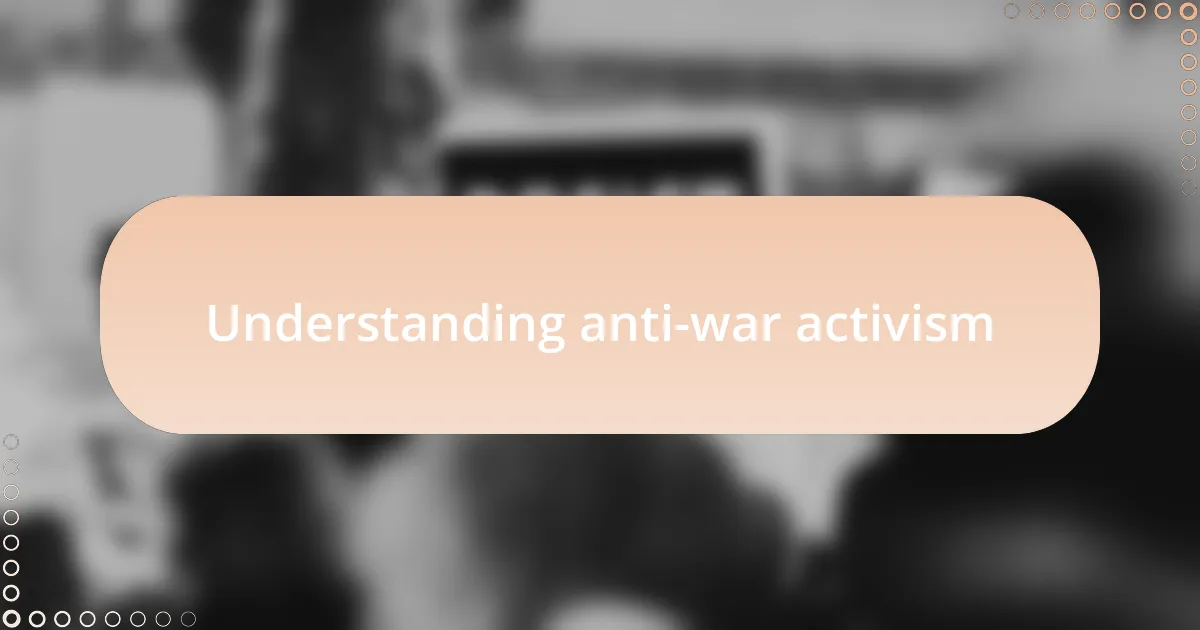
Understanding anti-war activism
Anti-war activism is rooted in the belief that conflicts should be resolved without violence, and it often springs from a deep sense of empathy for those affected by war. I remember attending a local peace rally many years ago, standing shoulder to shoulder with strangers who felt the weight of conflict in their hearts. It struck me then: how can we remain silent when so many suffer?
At its core, anti-war activism challenges not just the actions of governments but the narratives that justify war. I’ve seen friends become passionate advocates for peace after learning about the devastating consequences of military interventions. It’s inspiring to watch someone’s eyes open to the human stories behind the headlines, making the issue feel far more personal. Wouldn’t it be powerful if we all took that journey?
This movement also emphasizes the importance of dialogue and understanding. I often ask myself: how can we cultivate a culture of peace if we don’t engage with those who see conflict as a solution? It’s a complex issue that requires dedication, compassion, and an unwavering belief in the potential for change. Through struggles and triumphs, I’ve found that every small effort contributes to a larger ripple effect in our quest for peace.
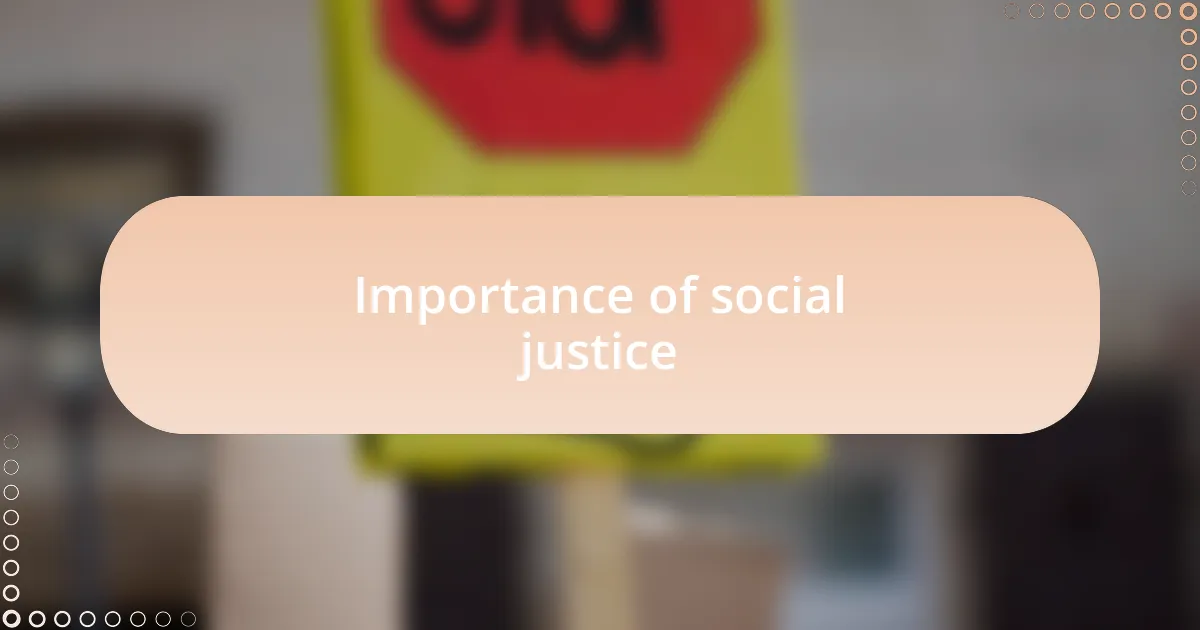
Importance of social justice
The importance of social justice lies in its capacity to elevate the voices of those who have been historically marginalized. I recall a time when I volunteered for an organization that focused on economic equality. Witnessing individuals find their strength to advocate for themselves opened my eyes. How often do we overlook the stories of those directly impacted by systemic inequality?
Social justice fosters a sense of community and belonging that transcends individual experiences. I remember a late-night discussion among friends about the injustices we witnessed in our neighborhoods. Sharing these moments not only deepened our connections but spurred us on to take action together. Isn’t it remarkable how collective awareness can ignite a passion for change?
At its heart, social justice challenges us to rethink our values. I often find myself pondering: what does it mean to be truly equitable in a world laden with disparity? Engaging with these questions encourages personal growth and motivates us to seek a world that nurtures every individual, not just a select few. In my journey, I’ve learned that small acts of kindness can ultimately lead to profound transformations in society.
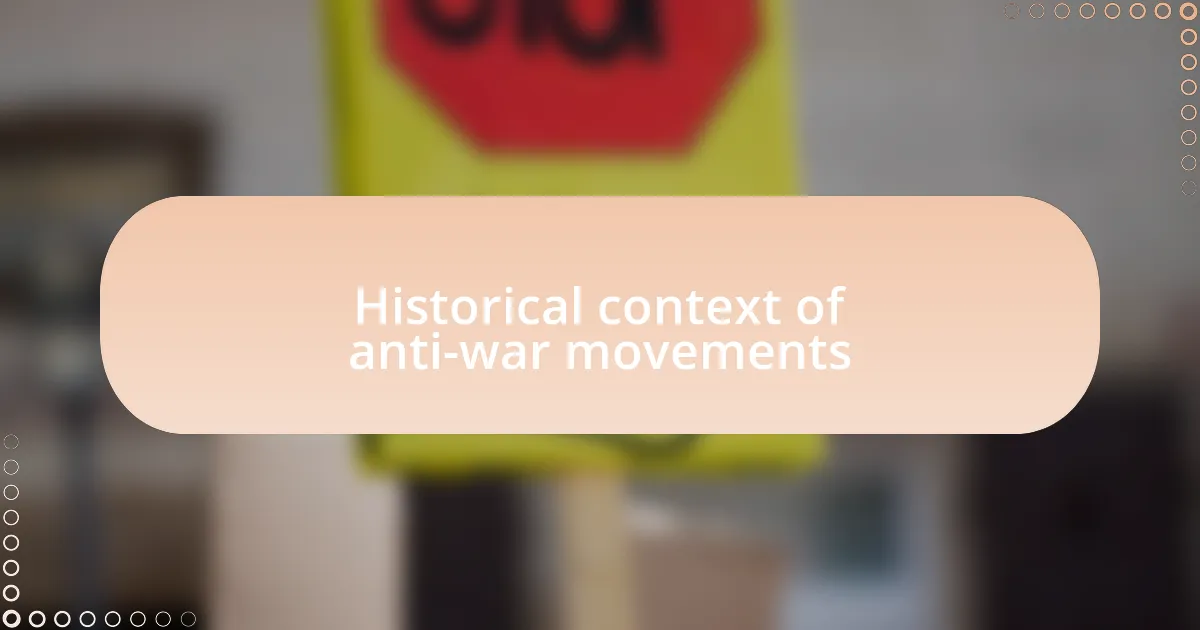
Historical context of anti-war movements
Anti-war movements have a rich and complex history, often intertwining with broader social justice issues. I remember delving into the protests against the Vietnam War in the 1960s, which were not only about opposing war but also confronting racial inequality and poverty. Isn’t it fascinating how different struggles can converge around a common goal of peace and justice?
The energy of the anti-war demonstrations during the 1980s, particularly against U.S. interventions in Latin America, deeply moved me. These movements were fueled by a growing awareness of how American foreign policy impacted vulnerable communities worldwide. Reflecting on this, I often ask myself: how can we ignore the human costs of war when so many lives are affected?
In the decades that followed, the rise of grassroots organizations highlighted the persistence of anti-war sentiments. I recall attending a local rally, where veterans and activists shared their stories of loss and resilience. Their voices reminded me of the importance of honoring those who suffered, underscoring that the fight for peace is ongoing. How can we, as advocates, ensure that these powerful narratives are not forgotten?
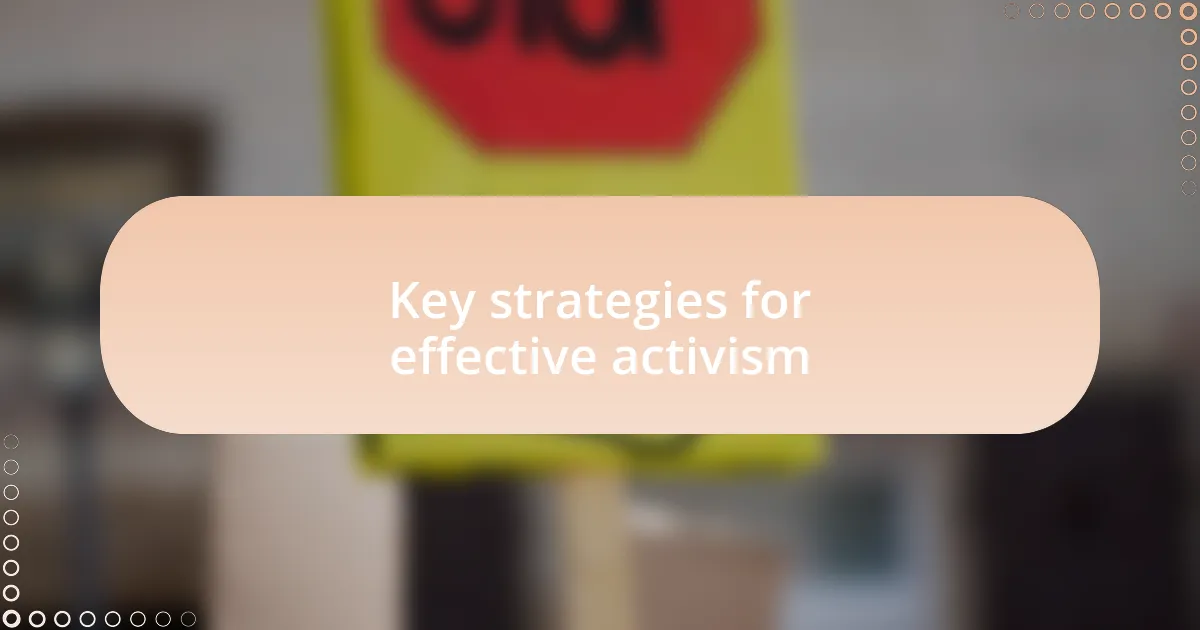
Key strategies for effective activism
Effective activism often hinges on strategic collaboration across various groups. I vividly remember organizing a community meeting where different activists shared their perspectives. It struck me how crucial it is to form coalitions that bridge gaps between various social issues, enhancing our collective impact for peace. How often do we overlook the power of unity in our movements?
Additionally, harnessing the power of storytelling can profoundly affect our outreach efforts. At a recent event, I witnessed how one personal narrative moved an entire audience to rethink their stance on military intervention. This connection between individual experiences and the broader cause reminds us to highlight the human element of our activism. Have you ever considered how a single story might inspire change?
Finally, leveraging social media has become an essential strategy for modern activism. I once coordinated a campaign through various platforms, reaching audiences far beyond our local community. It illuminated the potential of digital spaces to amplify our message and foster a supportive network. Isn’t it incredible how technology can transform our ability to mobilize and engage with supporters worldwide?
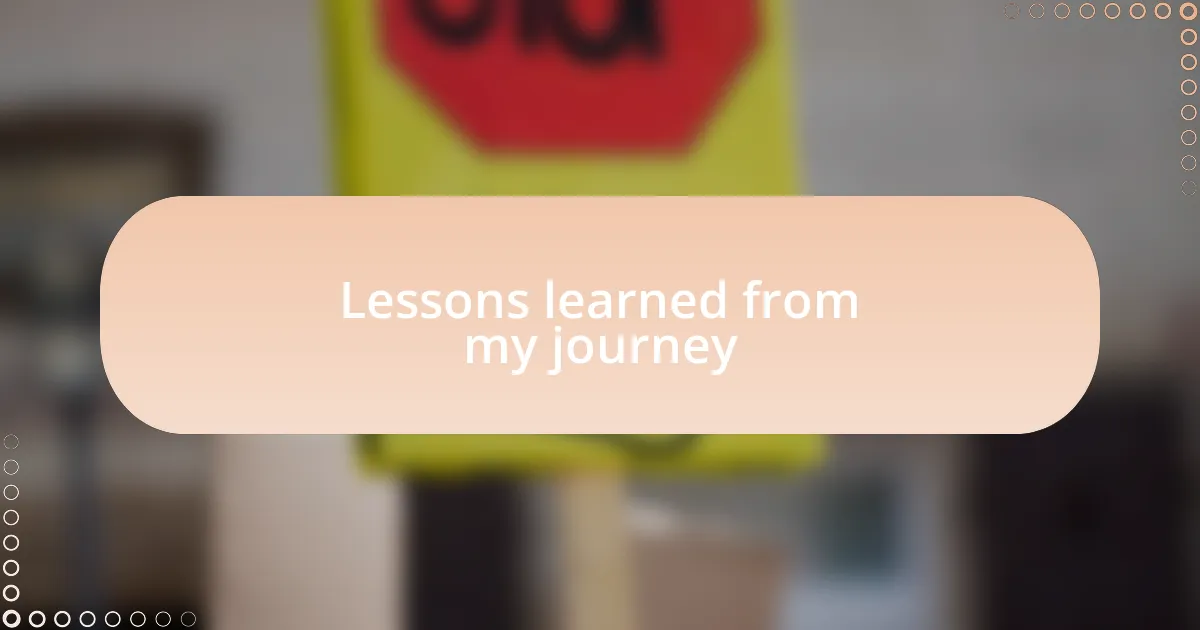
Lessons learned from my journey
Throughout my journey in social justice work, I’ve learned that patience is a necessary virtue. There was a time when I believed that change would happen overnight. I vividly recall a protest I organized that drew only a handful of participants. At first, it felt like a failure. However, reflecting on that experience taught me that every small effort contributes to the larger movement, even when it seems insignificant at the moment. Have you ever found yourself questioning the value of your contributions?
Another crucial lesson I’ve internalized is the importance of self-care in activism. I remember burning out after several months of relentless campaigning, feeling emotionally drained. Taking the time to recharge helped me recognize that a sustainable activism journey requires personal wellness. When we neglect our own needs, how can we effectively support others?
Lastly, embracing vulnerability has proven to be powerful in my work. During a discussion with fellow activists, I shared my fears about not making a difference. Instead of shying away from my feelings, I found that my honesty fostered deeper connections and opened doors for collaboration. Isn’t it fascinating how sharing our struggles can create a sense of community and shared purpose?
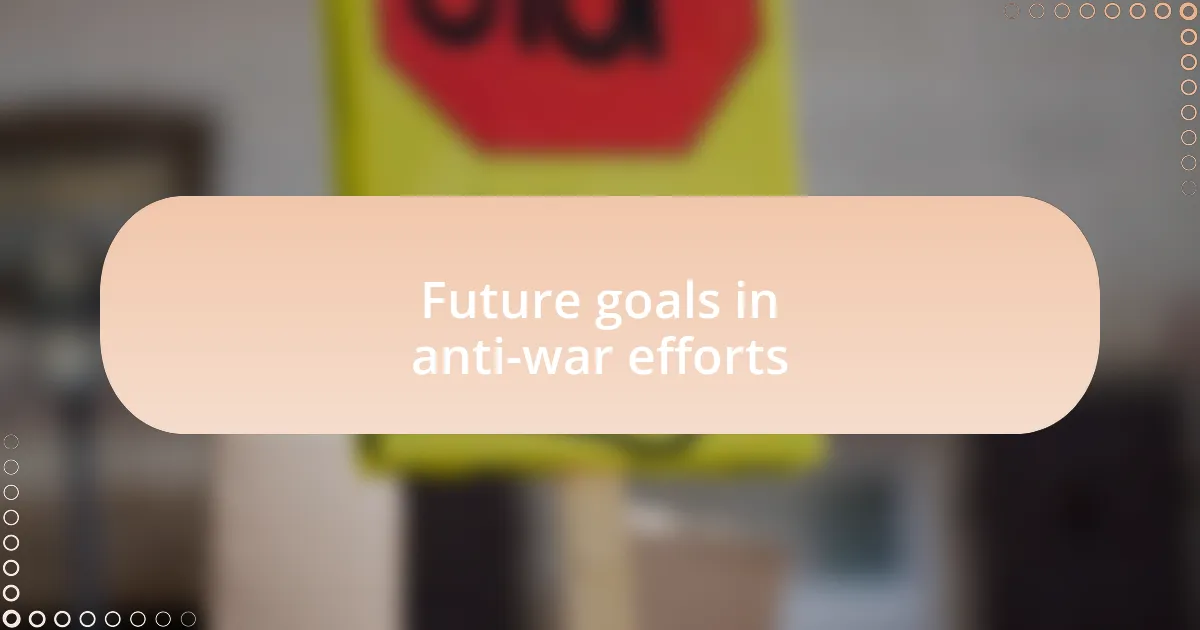
Future goals in anti-war efforts
As I look towards the future of anti-war efforts, one of my primary goals is to strengthen grassroots movements. In my experience, local initiatives often foster the most genuine connections among activists. I remember a community gathering where we engaged in a powerful discussion about the impact of war on our local lives. It struck me how personal stories could ignite action and bring people together against a common concern. How often do we underestimate the potential of our local networks?
Another important objective is to amplify the voices of those directly affected by war. I attended a powerful event where survivors shared their experiences, and it was an eye-opening moment for me. Listening to their stories not only deepened my understanding but also showed me the urgent need to prioritize their narratives in our advocacy. How can we claim to support peace without truly hearing from those who suffer the consequences of conflict?
Looking ahead, I’m also passionate about expanding our educational efforts surrounding anti-war activism. I often reflect on my own journey and how a lack of awareness about the complexities of war led me to misconceptions early on. By facilitating workshops and discussions that delve into the historical and social contexts of war, I believe we can equip a new generation of activists with the tools needed for effective change. Isn’t it crucial to understand the roots of conflict if we truly want to make a difference?